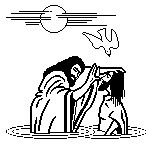|
The nature and work of the Holy Spirit
Jesus and the Holy Spirit were always one. At Jesus' public baptism by John, the Holy
Spirit came upon Him to equip Him for His mission and to demonstrate to all that He is the
Messiah - the one anointed by God as King and Lord of all.

Now that He is ascended, Jesus sends the Holy Spirit to reveal to us the truth about
Himself, the truth about our own lives and to equip us for ministry.
"But when he, the Spirit of truth, comes, he will guide you into all truth. He
will not speak on his own; he will speak only what he hears, and he will tell you
what is yet to come. He will bring glory to me by taking from what is mine and
making it known to you." (John_16:13-14).
"When the
counsellor comes, whom I will send to you from the Father, the
Spirit of truth who goes out from the Father, he will testify about me." (John_15:26).
The Greek word used for the Holy Spirit is `Parakletos' and is translated
"counsellor". Literally this means `someone called to one's side', and sometimes this is
translated `advocate', `comforter', `intercessor', or `consoler'.
The Holy Spirit as communicator
The Holy Spirit is our means of communication with
God. He can speak to us in a way we can recognise. For example:
"My sheep listen to my voice; I know them, and they follow me." (John_10:27).
"While they were worshipping the Lord and fasting,
the Holy Spirit said, set apart for me Barnabus and Saul for the work to which I have called them..."
(Acts_13:2).
We need to develop new listening skills, to put aside the noise of the world, and hear
the Holy Spirit. If He is received with grace and humility, with a teachable spirit (openness
on our part), then we can receive God's blessing - His support, protection, strength,
guidance and companionship. Our daily prayer is one way to listen to the Holy Spirit.
On the other hand, if the Holy Spirit encounters hardness of heart, insensitivity,
indifference, resistance or rebelliousness, we are in difficulty. The Bible warns us about this explicitly:
And the ultimate sin is blasphemy against the Holy Spirit. This is not just a swear word or
a stray loose word uttered in ignorance - but a deliberate, wilful and knowledgeable
insult against the Holy Spirit, attributing the works of the Holy Spirit as evil. It is a settled
rejection of Him (Matthew_12:22-32_and Luke_12:10).
Testing the "leading" of the Spirit
It is very important to test what we perceive to be the leading of the Holy Spirit, to see if it
is really of God. All of us can be misled through circumstances such as:
- Reading into a scripture something we want to be there.
- Bad advice or improper guidance from another. (Don't assume that someone who
seems to have power must 'have it right'. Power of itself is no indicator of Godliness).
- Mis-hearing, or partial hearing from God.
The Bible says to "test the spirits"
(1_John_4:1). Here are some tests you can use:
- Take your leading back to God in prayer - is this from you Lord?
- Is the 'word to you' in unity with God's 'written word', the Bible?
- Does it glorify Jesus?
- What are its characteristics - does it bring liberty, love, peace (Colossians_3:15) and
goodwill - or is it bringing pressure, worry and condemnation?
- Test your 'leading' in fellowship with one or more mature Christian(s)
you trust;
- Is it being affirmed by practical circumstances in your life?
- Is it coming to your attention through a variety of different channels and timings - all
with the same basic idea? God normally confirms His will to you.
- If you are not seeing it the same way as someone else, ask yourself - what is the
'spirit' they are coming from? Are they expressing a position of faith and the 'fruit of the
Spirit', or are the expressing fears, doubts, negativity and dark clouds?
When God speaks to us, not just one of the above tests will ring true, they probably all will.
Test your leading by running it through this grid. If it's from God, it should come through
such tests with a clear inner conviction and peace.
Once we have a 'word' / 'vision' / 'leading' from God, we must
be faithful to see it through.
The Fullness of the Holy Spirit
When we become Christians we are spiritually reborn, through the work of the Holy Spirit.
Our Baptism with water is the sign and seal of our rebirth and the Spirit becoming resident
in our lives. (Romans_8:9, Ephesians_1:13-14)
One of the roles of the Holy Spirit in our Christian life is to empower us for mission
and ministry. Every Christian needs the fullness of the Spirit in their life if they are to be joyful
and effective in their life and witness. We should seek and pray that the Holy Spirit be in
every part of our being. The New Testament exhorts us to "be filled with the Spirit"
(Ephesians_5:18). In the original Greek this is in the present continuous tense. Hence the full meaning
is "Go on being filled with the Spirit". As Christians we are sometimes like a leaky bucket
which has holes to be plugged, so that we need to be constantly filled with the living water
that comes from Christ. Jesus encourages us to seek the Holy Spirit from God:
"If you then, though you are evil, know how to give good gifts to your
children, how much more will your Father in heaven give the Holy Spirit to those who
ask him!" (Luke_11:13).
In the early Church we have recorded a number of occasions when the disciples were
filled with the Spirit, such as Acts_4:31:
"After they prayed, the place where they were meeting was shaken. And
they were all filled with the Holy Spirit and spoke the word of God boldly".
Sometimes in Acts water baptism preceded Spirit baptism, and on other occasions it was
the other way around. From this we see that we can't put God in a box, or reduce His
activities to neat equations in life! We will be studying this further in a later Unit.
The Holy Spirit and the Body of Christ
The following guide may help us search out some of the ways the Holy Spirit operates in
the Church:
- The signs of the Holy Spirit
His presence brings joy (Acts_13:52); a sense of God's presence; a love of Christ and
of others; a desire to worship; a desire to read the Bible; a desire for fellowship; a love of
the truth; and strength to handle testing and faith stretching situations.
- The fruit of the Holy Spirit
These are listed in Galatians_5:16-26. Note that Jesus said:
"By their fruit you will recognise
them." (Matthew_7:16). This means that the reality of a person's walk with
Christ should be tested by the fruit of the person's life,
not by power or gifting etc. It is vital
to recognise this distinction. Compare the positive fruits of the Spirit and the negative acts
of sinful nature (see the table in the Personal Study section).
- The gifts of the Holy Spirit
As we have already noted the sign of the Spirit's presence in our life is the fruits of the Spirit
- "love, joy, peace ...". But gifts may also accompany the filling and empowering of the
Holy Spirit in your life. There is a wide variety of gifts as we have seen. One of the gifts
is "speaking in tongues" (1_Corinthians_12:10). This
is not the sign of the Spirit's presence,
but a sign. Some Christians experience this gift, others do not. It is definitely
not the test of whether you are a Christian.
The gifts are specific outworkings of the Spirit. They are
'equipment for service'. Some of these are listed in 1_Corinthians_12 and Romans_12:6-8. Take time to review these summaries
and make a list by combining these scriptures.
There are several things we may say about the gifts at this point:
- They are vital if the church is to be equipped and empowered;
- They are to be sought (1_Corinthians_12:31);
- They are given for the common good, not just to bless the individual (1_Corinthians_12:7);
- They are the work of the Spirit, given as He
determines (1_Corinthians_12:11); and they are intended to be used as a part of team work -
not one person having all the gifts, (1_Corinthians_12:29);
- They are not an indicator of a Christian's maturity;
- They are not to be a cause of division in the Church (1_Corinthians_12:25), but always to
be exercised in love for the building up of the Body. The principal tests for the use of
the gifts are:
- Do they glorify Christ, and
- Are they being used in love?
- They are to be encouraged, matured and developed through use and testing.
- The greatest gift of all
More important than any ability or achievement, is
love. In 1 Corinthians we have Chapters 12 and
14 about the gifts, and sandwiched in between is chapter 13 on love.
There are four words for love in the classical Greek language, which include the
following ideas:
|


